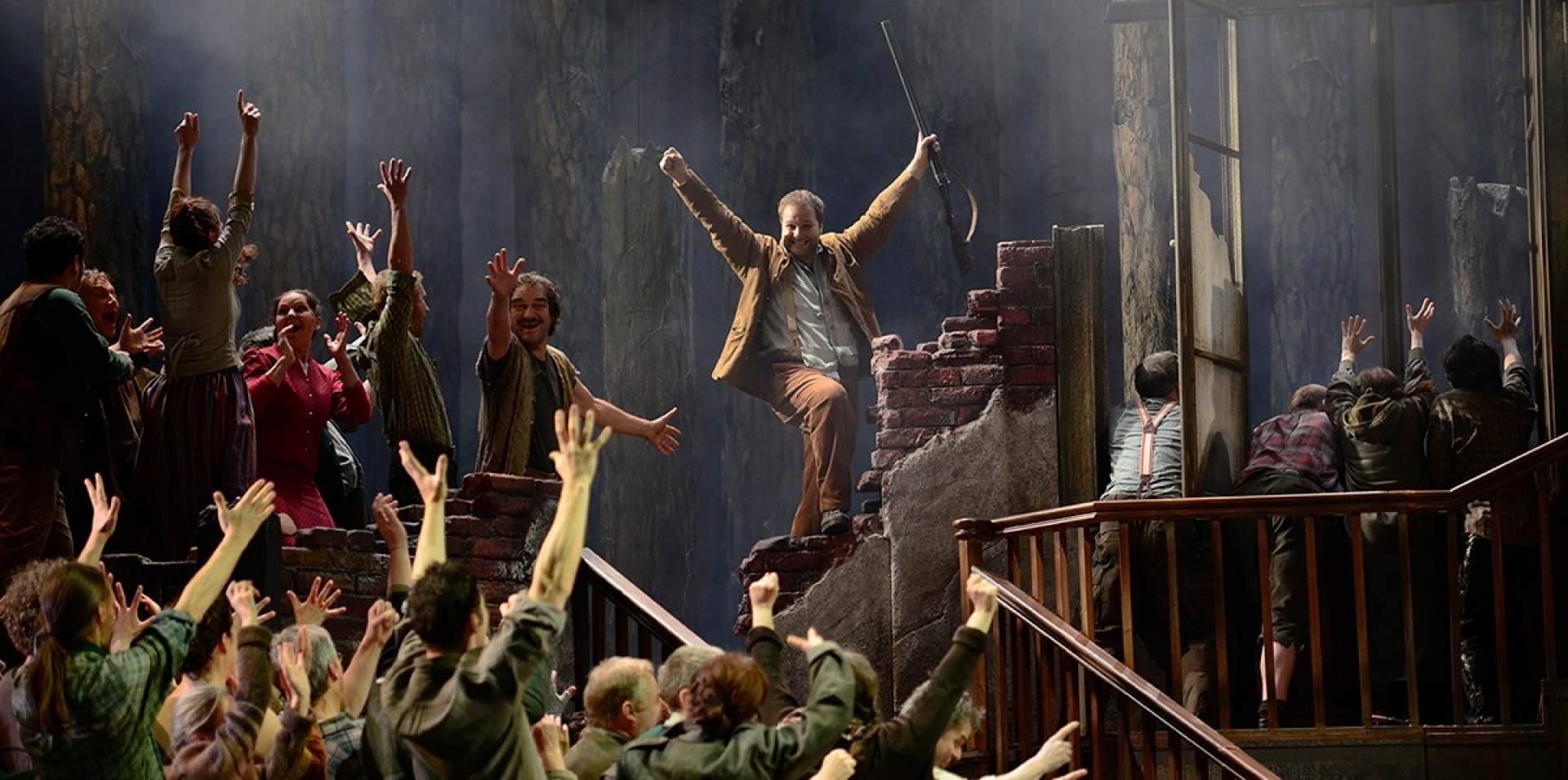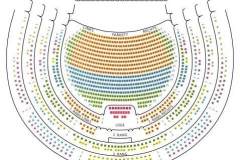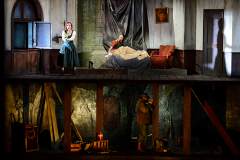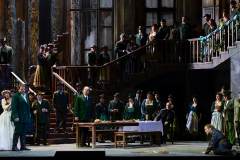The Marksman
February 2025 | ||||||
|---|---|---|---|---|---|---|
Mo | Tu | We | Th | Fr | Sa | Su |
Der Freischütz / The Marksman - Carl Maria von Weber
Romantic opera in three acts
Libretto by Friedrich Kind with dialogues by Werner Hintze
Performed in German with German and English supertitles
Premiere: May 1, 2015
Fantastic choruses and a gripping plot in this supernatural opera thriller.
Synopsis
Place: Bohemia
Time: shortly after the end of the Thirty Years' War
Act 1
At a shooting contest, the second assistant forester, Max, loses to a peasant, Kilian, who is proclaimed "King of marksmen" (Chorus: Viktoria! Der Meister soll leben—"Victory! Long live the master"). Kilian mocks him good-naturedly (Schau der Herr mich an als König—"Let him gaze on me as king").
Max wants to marry Agathe, daughter of the head forester Kuno. In order to marry her and succeed her father as head forester, he has to prove his marksmanship and score in a shooting trial before Ottokar, the sovereign prince, on the following day.
As Max has had ill luck for several days, he muses upon his prospects of losing Agathe by failing the shooting test (Trio of Kuno, Kaspar, and Max; chorus: O diese Sonne—"O this sun"). Left alone in deep melancholy, he recalls happy days (Aria: Durch die Wälder, durch die Auen—"Through the forests, through the meadows").
Kaspar, the first assistant forester, falsely tries to imbue Max with wine and courage (Hier im ird'schen Jammerthal—"Here in this vale of tears"). He had hoped to marry Agathe himself but she had rejected him and chosen Max. The marriage would make Max the heir of Kuno who would see Max as a son. Kaspar seeks revenge upon all three—his rival, his former sweetheart and her father. He hands Max his gun and Max, to his own astonishment, hits an eagle soaring at a great height. Kaspar explains that the gun had been loaded with his last magic bullet.
He persuades Max to meet him at midnight in the terrible Wolf's Glen to cast seven more of the magic bullets. (Six hit, but the seventh belongs to the Evil One who can guide it wherever he pleases.) He warns Max not to tell a soul about their purpose so as not to endanger them. Left alone, Kaspar triumphs and boasts of his insidiousness (Aria: Schweig’! damit dich niemand warnt—"Silence! So that nobody warns you.").
Act 2
Agathe's chamber
At the moment when Max shoots the magic bullet, a picture of Agathe's ancestor hanging on the wall falls to the floor, slightly wounding her. Agathe's cousin and companion Ännchen refastens the hook (Duet: Schelm, halt fest!—"Rogue, hold fast!"). She endeavours to cheer Agathe with jests (Ännchen: Kommt ein schlanker Bursch gegangen—"Comes a pretty boy this path"). Agathe, still disturbed, tells of her meeting with the hermit. He had indicated a danger from which his white consecrated roses would protect her.
Left alone, Agathe awaits Max with the news of his success (Recitative and aria: Wie nahte mir der Schlummer...Leise, leise—"How did slumber approach me...Low, low"). Max arrives, acknowledging that while he has not been the victor, he has killed an eagle. Though the night is falling, he has to leave again to bring in a stag which he had shot in the Wolf's Glen (Trio: Wie? Was? Entsetzen!—"What? What? Oh, horror!").
The Wolf's Glen at night
As the bell chimes twelve Kaspar calls upon Samiel, the Black Huntsman, for assistance in casting the magic bullets. Having already sold his own soul, which is due the next day, Kaspar offers Max’s soul in exchange for a prolongation of his soul of three years. Agathe is to be killed by Max's magic bullet, despair will then make Max and Kuno the Devil's. Samiel agrees ambiguously: "So be it—By the gates of hell! Tomorrow he or you!"
As Max arrives, the spirit of his mother warns him to abandon the project. But Samiel conjures up Agathe, seemingly drowning herself in despair, whereupon Max plunges into the glen. With demoniacal noise, the casting of the bullets begins.
Act 3
The meeting of the marksmen
Having split the seven bullets between them, Max has used three during the hunt in the morning. Kaspar spoils his three on a fox. Thus Max's remaining bullet is the seventh, the Devil's bullet.
Agathe's chamber
Agathe is praying (Aria: Und ob die Wolke sie verhülle—"Though clouds obscure"), her doubts having returned owing to a dream of ill omen where she was a white dove which Max shot. Ännchen tries to cheer her with a ghost tale (Aria: Einst träumte meiner sel'gen Base—"My deceased cousin had a dream"). The bridesmaids bring the box with the bridal wreath (Song: Wir winden dir den Jungfern-Kranz—"We wind round thee the bridal wreath"). But as they open it they find a funeral wreath. Recalling the hermit's promise that the white roses will protect her, Agathe proposes to twine them to the bridal wreath.
The marksmanship trial
Prince Ottokar awaits Max at his tent (Chorus of foresters: Was gleicht wohl auf Erden—"What excels the pleasures of the chase"). As a test, Max is ordered to shoot the dove pointed out to him. Max takes aim, fires and Agathe, who has just entered the scene, falls as if hit (Finale: Schaut, o schaut—"See, oh see"). But her bridal wreath and the hermit behind her have deflected the bullet. It strikes Kaspar. Agathe revives from her faint and Kaspar, seeing a holy hermit by her side, realizes that he has failed. Samiel grasps him instead of Max, whereupon Kaspar expires, cursing hell and heaven.
Prince Ottokar orders the corpse to be thrown into the Wolf's Glen. Then he demands an explanation from Max, who confesses to shooting with magic bullets. Regardless of pleas from Kuno, Agathe, peasants, and huntsmen, the infuriated Prince forbids the marriage and banishes Max from the country.
The hermit seeks to appease the Prince (Aria: Wer legt auf ihn so strengen Bann! Ein Fehltritt, ist er solcher Büssung wert?—"Who lays so strict a sentence upon him? An error, is it worthy of such atonement?"). Only love of Agathe and fear of losing her had caused Max to stray from a life that was formerly without fault. Who is to raise the first stone? Who does not look into his own heart? Once he has completed a faultless probationary year, Max should be allowed to marry Agathe. To the exuberant joy of all the Prince accepts this judgement. After the probation, he himself will place the hand of Agathe in that of Max.
In the end, all join in a prayer of thanks.
Program and cast
Ottokar: Markus Butter
Kuno: Tilmann Rönnebeck
Agathe: Golda Schultz
Ännchen: Mirjam Mesak
Kaspar: Ante Jerkunica
Max: Maximilian Schmitt
A Hermit: Alexandros Stavrakakis
Kilian: Anton Beliaev
First Bridesmaid: Gabriele Berke, Maria Eberth
Second Bridesmaid: Rahel Haar, Christiane Neumann
Third Bridesmaid: Jana Hohlfeld, Ute Siegmund
Fourth Bridesmaid: Cornelia Butz, Heike Liebmann
Musical Direction: Georg Fritzsch
Direction: Axel Köhler
Stage: Arne Walther
Costumes: Katharina Weissenborn
Lighting: Fabio Antoci
Choreography: Katrin Wolfram
Stage Combat: Klaus Figge
Choir: Jan Hoffmann
Dramaturgy: Werner Hintze
Saxon State Opera Choir Dresden
Saxon State Orchestra Dresden
Project Partners:
Sparkassen-Finanzgruppe Sachsen
Ostsächsische Sparkasse Dresden
Sparkassen-Versicherung Sachsen
LBBW
Semperoper Dresden
The Semperoper is the opera house of the Sächsische Staatsoper Dresden (Saxon State Opera) and the concert hall of the Sächsische Staatskapelle Dresden (Saxon State Orchestra). It is also home to the Semperoper ballet. The building is located near the Elbe River in the historic centre of Dresden, Germany.
The opera house was originally built by the architect Gottfried Semper in 1841. After a devastating fire in 1869, the opera house was rebuilt, partly again by Semper, and completed in 1878. The opera house has a long history of premieres, including major works by Richard Wagner and Richard Strauss.
The first opera house at the location of today's Semperoper was built by the architect Gottfried Semper. It opened on 13 April 1841 with an opera by Carl Maria von Weber. The building style itself is debated among many, as it has features that appear in three styles; Early Renaissance and Baroque, with Corinthian style pillars typical of Greek classical revival. Perhaps the most suitable label for this style would be eclecticism, where influences from many styles are used, a practice most common during this period. Nevertheless, the opera building, Semper's first, is regarded as one of the most beautiful European opera houses.

 EN
EN DE
DE IT
IT FR
FR ES
ES RU
RU JP
JP RO
RO
 Seating plan
Seating plan 


